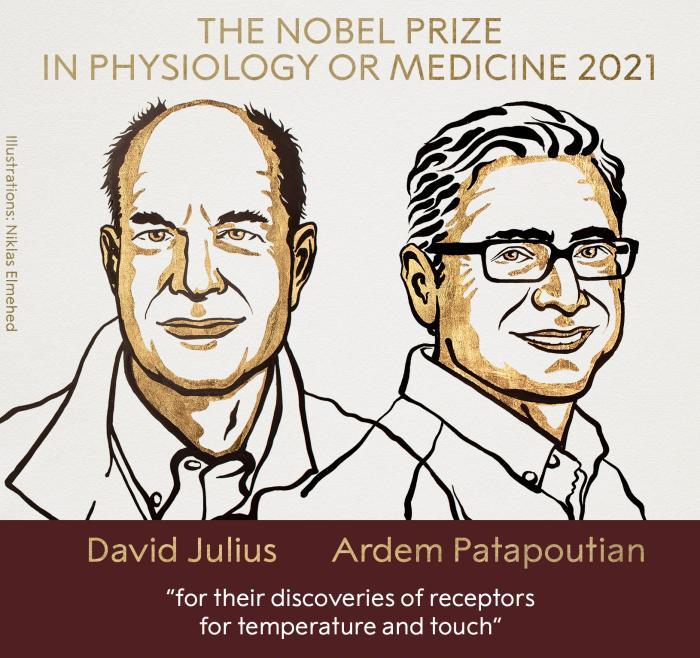According to the official website of the Nobel Prize, on the afternoon of the 4th Beijing time, the 2021 Nobel Prize in Physiology or Medicine was announced, and American scientists David Julius and Arden Patapoutian won the prize for their discoveries in feeling temperature and touch.

Scientists David Julius and Ardem Patapoutian jointly won the 2021 Nobel Prize in Physiology or Medicine. Image source: Nobel Prize official website
From 1901 to 2020, the Nobel Prize in Physiology or Medicine was awarded 111 times, with a total of 222 winners. The following are the winners and achievements of the Nobel Prize in Physiology or Medicine in the past 10 years:
On October 5, 2020, the Karoline Medical School in Sweden announced that the 2020 Nobel Prize in Physiology or Medicine will be awarded to American scientists Harvey Alter, Charles Rice, and British scientist Michael Horton for their contributions to the discovery of the hepatitis C virus.
In 2020
American scientists Harvey Alter and Charles Rice, as well as British scientist Michael Horton, were awarded for their contributions to the discovery of the hepatitis C virus.
In 2019
American scientists William Kelling, Greg Semenza, and British scientist Peter Ratcliffe were awarded for their contributions to "discovering how cells perceive and adapt to oxygen supply."
In 2018
American immunologist James Allison and Japanese immunologist Yuki Honjo won the Nobel Prize in Physiology or Medicine for discovering cancer therapies that inhibit negative immunomodulation.
In 2017
American scientists Jeffrey Hall, Michael Rothbash and Michael Youngn won the Nobel Prize in Physiology or Medicine for explaining how many plants and animals adapt biological rhythms to the day-night changes that follow the Earth's rotation.
In 2016
Japanese molecular cell biologist Yoshinori Osumi was awarded the 2016 Nobel Prize in Physiology or Medicine for discovering the mechanism of autophagy.
On December 10, 2015, local time, stockholm, Sweden, the Nobel Prize ceremony was held. Tu Youyou, winner of the Nobel Prize in Physiology or Medicine, received the prize.
In 2015
Chinese scientist Tu Youyou won the Nobel Prize in Physiology or Medicine for "proposing therapies of artemisinin and dihydroartemisinin in combination with traditional Chinese medicine and Traditional Chinese and Western medicine"; irish scientist William Campbell and Japanese scientist Tomoyuki Omura won the prize for "discovering a new treatment for an infection caused by ascaria parasitic disease".
In 2014
British scientist John O'Keefe and two Norwegian scientists, Edward Mossor and May Brett Mosor, were awarded the Nobel Prize in Physiology or Medicine for "discovering the cells that make up the brain's localization system."
In 2013
The American scientist James M. E. Rothman and Randy-W. Schekman, as well as German scientist Thomas-C. Suderhof, were awarded the Nobel Prize in Physiology or Medicine for "a new discovery in the field of intracellular transport systems, the discovery of the mechanisms by which cell vesicle traffic operates and regulates."
Infographic: British developmental biologist John Gordon and Japanese scientist Shinya Yamanaka.
In 2012
British scientist Sir John Gordon and Japanese scientist Shinmyo Yamanaka won the Nobel Prize in Physiology or Medicine for "discovering that mature cells can be rewritten into pluripotent cells".
In 2011
American scientist Bruce Butler and French scientist Jules Holman received the Nobel Prize in Physiology or Medicine for their "discovery of activation of innate immune mechanisms"; Canadian scientist Ralph Steinmann also received the prize for "discovering dendritic cells and their role in acquired immunity".
Source: China News Network